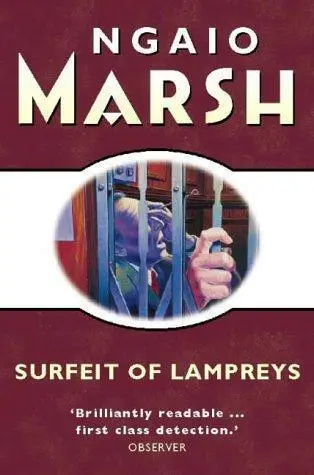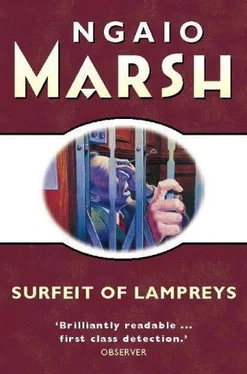Ngaio Marsh - Death of a Peer
Здесь есть возможность читать онлайн «Ngaio Marsh - Death of a Peer» весь текст электронной книги совершенно бесплатно (целиком полную версию без сокращений). В некоторых случаях можно слушать аудио, скачать через торрент в формате fb2 и присутствует краткое содержание. Жанр: Классический детектив, на английском языке. Описание произведения, (предисловие) а так же отзывы посетителей доступны на портале библиотеки ЛибКат.
- Название:Death of a Peer
- Автор:
- Жанр:
- Год:неизвестен
- ISBN:нет данных
- Рейтинг книги:3 / 5. Голосов: 1
-
Избранное:Добавить в избранное
- Отзывы:
-
Ваша оценка:
- 60
- 1
- 2
- 3
- 4
- 5
Death of a Peer: краткое содержание, описание и аннотация
Предлагаем к чтению аннотацию, описание, краткое содержание или предисловие (зависит от того, что написал сам автор книги «Death of a Peer»). Если вы не нашли необходимую информацию о книге — напишите в комментариях, мы постараемся отыскать её.
Death of a Peer — читать онлайн бесплатно полную книгу (весь текст) целиком
Ниже представлен текст книги, разбитый по страницам. Система сохранения места последней прочитанной страницы, позволяет с удобством читать онлайн бесплатно книгу «Death of a Peer», без необходимости каждый раз заново искать на чём Вы остановились. Поставьте закладку, и сможете в любой момент перейти на страницу, на которой закончили чтение.
Интервал:
Закладка:
Ngaio Marsh
Death of a Peer

For Sir Hugh and Lady Acland with my love. For the one since he has helped me so often with my stories and for the other since she likes stories about London.
Cast of Characters
ROBERTA GREY
LORD CHARLES LAMPREY
LADY CHARLES LAMPREY
HENRY LAMPREY, their eldest son
FRIEDE LAMPREY (FRID), their elder daughter
COLIN AND STEPHEN LAMPREY, twins, their second and third sons
PATRICIA LAMPREY (PATCH), their second daughter
MICHAEL LAMPREY (MIKE), their youngest son
MRS. BURNABY (NANNY), their nurse
BASKETT, their butler
CORA BLACKBURN, their parlour-maid
STAMFORD, a commissionaire
GRIMBALL, a “bum”
THE LADY KATHERINE LOBE, aunt to Lord Charles
GABRIEL, MARQUIS OF WUTHERWOOD AND RUNE
(UNCLE G.), elder brother to Lord Charles
VIOLET, MARCHIONESS OF WUTHERWOOD AND RUNE
(AUNT V.), his wife
GIGGLE, their chauffeur
TINKERTON, Lady Wutherwood’s maid
DR. KANTRIPP, the Lampreys’ doctor
SIR MATTHEW CAIRNSTOCK, a brain specialist
DR. CURTIS, police surgeon
DETECTIVE-INSPECTOR FOX of the Central Branch, Criminal Investigation Department
CHIEF DETECTIVE-INSPECTOR ALLEYN of the Central Branch, Criminal Investigation Department
DETECTIVE-SERGEANT BAILEY, a finger-print expert
DETECTIVE-SERGEANT THOMPSON, a photographic expert
POLICE-CONSTABLE MARTIN
POLICE-CONSTABLE GIBSON A police-constable who has read “Macbeth”
DETECTIVE-SERGEANT CAMPBELL, on duty at 24 Brummell Street
NIGEL BATHGATE, Watson to Mr. Alleyn
MRS. MOFFATT, housekeeper at 24 Brummell Street
MOFFATT, her husband
MR. RATTISBON, solicitor
Chapter I
Prelude in New Zealand
Roberta Grey first met the Lampreys in New Zealand. She was at school with Frid Lamprey. All the other Lampreys went to school in England: Henry, the twins and Michael to Eton; Patch to an expensive girls’ school near Tonbridge. In the New Zealand days, Patch and Mike were too little for school. They had Nanny and, later on, a governess. But when the time came for Frid to be bundled off to England there was a major financial crisis and she became a boarder at Te Moana Collegiate School for Girls. Long after they had returned to England the family still said that Frid spoke with a New Zealand accent, which was nonsense.
In after years Roberta was to find a pleasant irony in the thought that she owed her friendship with the family to one of those financial crises. It must have been a really bad one because it was at about that time that Lady Charles Lamprey suddenly got rid of all her English servants and bought the washing machine that afterwards, on the afternoon it broke loose from its mooring, so nearly killed Nanny and Patch. Not long after Frid went to board at Te Moana an old aunt of Lord Charles’s died, and the Lampreys were rich again, and all the servants came back, so that on Roberta’s first visit Deepacres seemed very grand indeed. In New Zealand the Lampreys were a remarkable family. Titles are rare in New Zealand and the younger sons of marquises are practically nonexistent.
In two years’ time Roberta was to remember with nostalgic vividness that first visit. It took place during the half-term week-end, when the boarders at Te Moana were allowed to go home. Two days beforehand, Frid asked Roberta if she would spend the half-term at Deepacres. There were longdistance telephone calls between Deepacres and Roberta’s parents.
Frid said: “Do come, Robin darling, such fun,” in a vague, kind voice.
She had no idea, of course, that for Roberta the invitation broke like a fabulous rocket, that Roberta’s mother, when Lady Charles Lamprey telephoned, was thrown into a frenzy of sewing that lasted until two o’clock in the morning, that Roberta’s father bicycled four miles before eight o’clock in order to leave at Te Moana a strange parcel, a letter of instruction on behaviour, and five shillings to give the housemaid. Frid always sympathized when Roberta said her people were poor, as though they were all in the same boat, but the poverty of the Lampreys, as Roberta was to discover, was a queer and baffling condition understood by nobody, not even their creditors, and certainly not by poor Lord Charles with his eye-glass, his smile and his vagueness.
It was almost dark when the car arrived at Te Moana. Roberta was made shy by the discovery of Lady Charles in the front seat beside the chauffeur, and of Henry, dark and exquisite, in the back one. But the family charm was equal to more than the awkwardness of a child of fourteen. Roberta yielded to it in three minutes and it held her captive ever afterwards.
The thirty-mile drive up to the mountains was like a dream. Afterwards, Roberta remembered that they all sang an old song about building a stairway to Paradise, and that she felt as though she floated up the stairway as she sang. The surface of the road changed from tar to shingle; stones banged against the underneath of the car; the foothills came closer and salutary drifts of mountain air were blown in at the window. It was quite dark when they began to climb the winding outer drive of Deepacres. Roberta smelt native bush, cold mountain water and wet loam. The car stopped, and Henry, groaning, got out and opened the gate. That was to be Roberta’s clearest picture of Henry — struggling with the gate, screwing up his face in the glare of the headlights. The drive up to Deepacres seemed very long indeed. When at last they came out on a wide gravelled platform before the house, something of Roberta’s shyness returned.
Long after the Lampreys had gone to England Roberta would sometimes dream that she returned to Deepacres. It was always at night. In her dream the door stood open, the light streamed down the steps. Baskett was in the entrance with a young footman whose name Roberta, in her dreams, had forgotten. The smell of blue-gum fires, of the oil that Lady Charles burnt in the drawing-room, and of cabbage-tree bloom would come out through the open door to greet her. There, in the drawing-room, as on that first night, she would see the family. Patch and Mike had been allowed to stay up; the twins, Stephen and Colin, that week arrived from England, were collapsed in arm-chairs. Henry lay on the hearthrug with his shining head propped against his mother’s knee. Lord Charles would be gently amused at something he had been reading in a month-old Spectator . Always he put it down out of politeness to Roberta. The beginning of the dream never varied, or the feeling of enchantment.
The Lampreys appeared, on that first night, to scintillate with polish, and the most entrancing worldly-wisdom. Their family jokes seemed then the very quintessence of wit. When she grew up Roberta had still to remind herself that the Lampreys were funny but, with the exception of Henry, not witty. Perhaps they were too kind to be wits. Their jokes depended too much on the inconsequent family manner to survive quotation. But on that first night Roberta was rapturously uncritical. In retrospect she saw them as a very young family. Henry, the eldest, was eighteen. The twins, removed from Eton during the last crisis, were sixteen; Frid was fourteen, Patricia ten, and little Michael was four. Lady Charles — Roberta never could remember when she first began to call her Charlot — was thirty-seven, and it was her birthday. Her husband had given her the wonderful dressing-case that appeared later, in the first financial crisis after Roberta met them. There were many parcels, arrived that day from England, and Lady Charles opened them in a vague pleased manner, saying of each one that it was “great fun,” or “charming,” and exclaiming from time to time: “How kind of Aunt M.!” “How kind of George!” “How kind of the Gabriels!” The Gabriels had sent her a bracelet and she looked up from the cards and said: “Charlie, it’s from both of them. They must have patched it up.”
Читать дальшеИнтервал:
Закладка:
Похожие книги на «Death of a Peer»
Представляем Вашему вниманию похожие книги на «Death of a Peer» списком для выбора. Мы отобрали схожую по названию и смыслу литературу в надежде предоставить читателям больше вариантов отыскать новые, интересные, ещё непрочитанные произведения.
Обсуждение, отзывы о книге «Death of a Peer» и просто собственные мнения читателей. Оставьте ваши комментарии, напишите, что Вы думаете о произведении, его смысле или главных героях. Укажите что конкретно понравилось, а что нет, и почему Вы так считаете.











